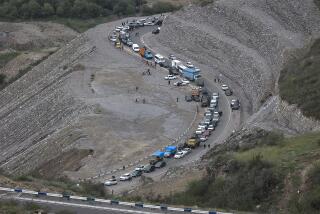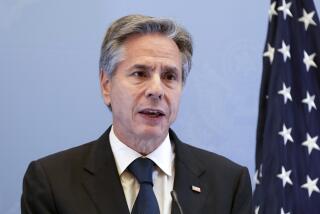Diplomats work into the night seeking deal on Iran’s nuclear program
WASHINGTON -- Diplomats in Geneva worked into the evening Saturday to avoid a disappointing and inconclusive end to the effort to cobble a preliminary deal to place limits on Iran’s nuclear program.
The seven-nation talks had appeared headed for an announcement of a deal two days ago, but objections from France and perhaps other countries to a draft text raised complications that diplomats were unable to quickly resolve.
While Secretary of State John F. Kerry huddled with European Union foreign policy chief Catherine Ashton and Iranian Foreign Minister Mohammad Javad Zarif and then separately with Russian Foreign Minister Sergei Lavrov, it appeared that negotiations might adjourn for a week or more while diplomats consulted their capitals about political and technical issues.
France, which has long taken a hard line on Iran’s nuclear program, asked for a halt to construction activity at a heavy water reactor that could be finished next year. It sought firmer treatment of Iran’s stockpile of medium enriched uranium, and changes to the group’s plans to ease the economic penalties that are crippling Iran’s economy.
“One wants a deal … but not a sucker’s deal,” Laurent Fabius, the French foreign minister, said in a Saturday interview with the France-Inter radio station. He said “major issues” remained to be overcome.
The preliminary deal is aimed at giving Iran limited and temporary sanctions relief in exchange for limited curbs on its nuclear program during the six months or so that it could take to work out a comprehensive final agreement to put limits on the nuclear program.
Iran has long maintained that its nuclear program is aimed at peaceful purposes but has faced punishing economic sanctions from an international community that suspects Tehran wants to develop nuclear weapons.
A “first step” deal would be seen as a major advance, following the decade of stalemated diplomacy over the nuclear issue. It comes at a time when bipartisan objections to the deal are gaining momentum in Congress, and when Israel’s government has attacked the U.S. approach.
Some Western diplomats grumbled about France’s objections. But diplomats said that Iranian negotiators had balked at some demands, and the government controlled Russian media reported that Kerry too had concerns.
Even so, Western diplomats insisted that they had the outline of deal and that it could fall into place quickly.
Western diplomats have long boasted about the unity of the so-called P5 Plus One group, which includes the five permanent members of the U.N. Security Council -- United States, Russia, China, France and Britain -- plus Germany. Thus a split is not a good sign for the much more difficult political choices that will be involved in the comprehensive deal.
“Seems as if the most difficult talks in Geneva are not with Iran, but within the Western group,” tweeted Swedish Foreign Minister Carl Bildt. “Not particularly good.”
ALSO:
Outspoken mayor from Mexico’s Michoacan state found dead
New Pentagon report paints mixed picture of Afghanistan security
Toronto Mayor Rob Ford loses radio show, calls mount for his exit
Twitter: @richtpau
More to Read
Start your day right
Sign up for Essential California for news, features and recommendations from the L.A. Times and beyond in your inbox six days a week.
You may occasionally receive promotional content from the Los Angeles Times.







